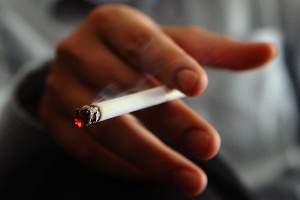The World Health Organisation (WHO) on Thursday called on Ghana to urgently ratify the Protocol on illicit trade of tobacco products in the country as a sure measure to protect public health.
The organisation urged the Ministry of Health to work to get the legal instrument on illicit trade of tobacco reviewed and submitted for parliamentary approval as soon practicable.
Dr Magda Robalo, WHO Country Representative, made the appeal at the opening of a two-day high level meeting on Tobacco Taxation Policy in the African Region in Accra.
The meeting on the general theme: “Raising Tobacco Taxes to benefit public Health,” serves to create a platform for information sharing on countries tobacco taxation systems.
Participants are made up of finance and revenue officers as well as health personnel from Ghana, Nigeria, Kenya, the Gambia, Sierra Leone and Burkina Faso.
Dr Robalo said tobacco-related illness continue to be one of the biggest health threat facing the world and approximately one person dies from a tobacco-related diseases every six seconds, equivalent to almost six million annually.
“The annual death rate is expected to rise to more than eight million by 2030 with more than 80 per cent of these preventable deaths occurring among people living in low and middle-income countries,” he said.
Dr Robalo therefore commended Ghana for making great strides in tobacco control efforts since signing and ratifying the Framework Convention on Tobacco Control (FCTC) in 2004 and 2006.
She mentioned the passing of the Public Health Bill in Ghana that guides and streamlines public health interest and prohibits smoking in public places, tobacco advertising, promotion and sponsorship.
Dr Victor Asare Bampoe, Deputy Minister of Health said government would continue to increase tobacco taxation to help protect the health of the people.
“Our motivation stems from evidence that has been accumulated over the past 50 years on the health and economic consequences of tobacco usage.
“Indeed research over the period has shown that high taxes on tobacco products leading to high prices of such products lead to a reduction in tobacco use,” Dr Bampoe said.
He expressed the hope that the meeting would provide participants with a framework of action that would lead to country specific tobacco taxation policy.
Dr Edward Larbi-Siaw, Tax Policy Advisor at the Ministry of Finance said the Ministry increased excise tax on tobacco products in the 2015 budget statement.
He said the increment was in line with the WHO objective of having a sizeable tax component in the retail price of tobacco products.
“This is the path we would continue to thread on,” Dr Larbi-Siaw said.
Dr Larbi-Siaw expressed gratitude to WHO for the technical support being giving to countries in West Africa to improve administrative capacity in the management of the excise tax regime on tobacco products in favour of tobacco control.
Dr Ahmed Ogwell Ouma, WHO Regional Adviser on Tobacco Control explained that the meeting provided a platform for countries to share experiences on how to curb illicit tobacco trading.
It was also to plan for the improvement of tobacco taxation that would help reduce the use of the product and ultimately, reduce non-communicable diseases in countries.
Health News of Friday, 12 June 2015
Source: GNA

















